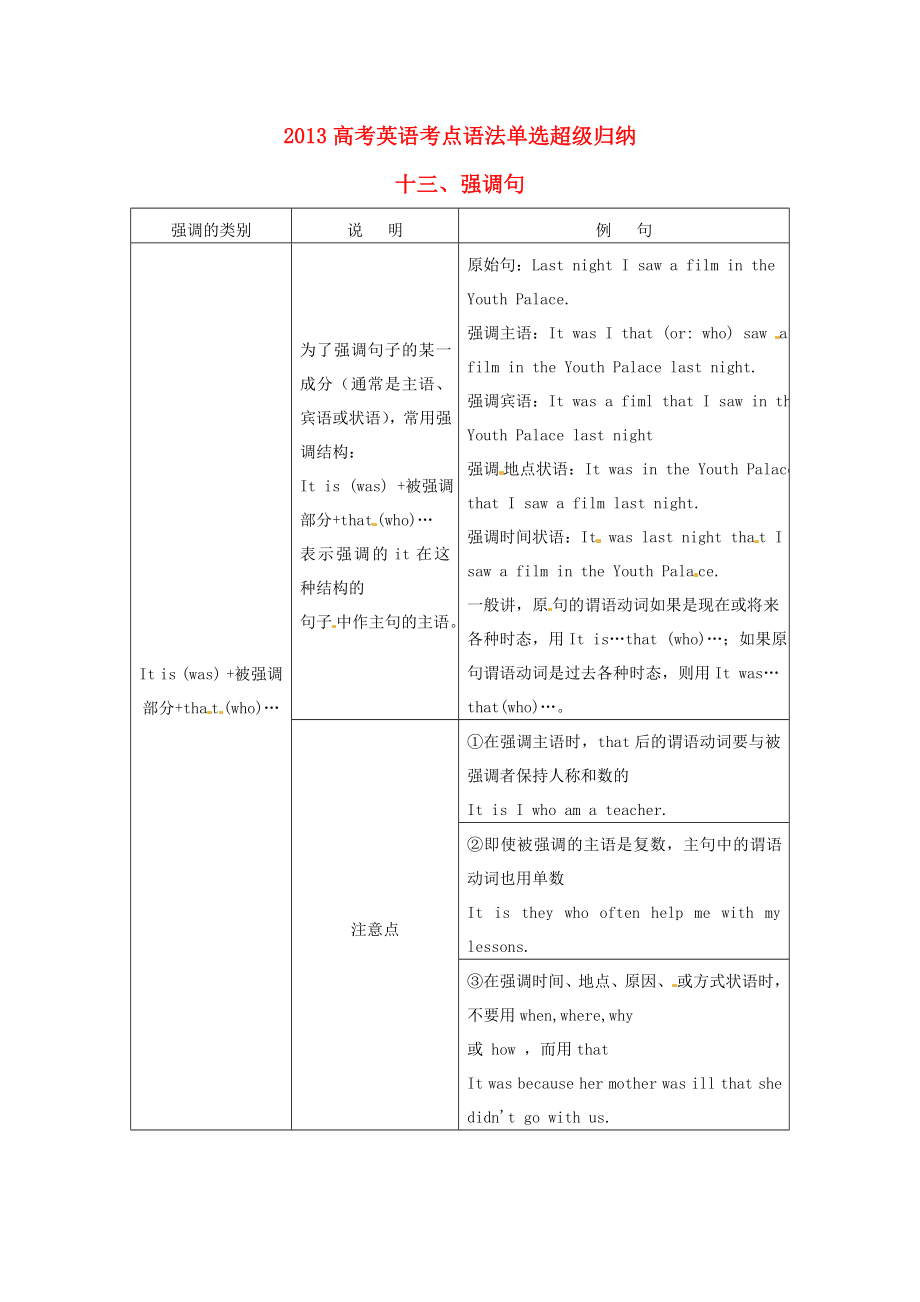《2013屆高考英語(yǔ) 考點(diǎn)語(yǔ)法歸納復(fù)習(xí)題13》由會(huì)員分享���,可在線(xiàn)閱讀����,更多相關(guān)《2013屆高考英語(yǔ) 考點(diǎn)語(yǔ)法歸納復(fù)習(xí)題13(3頁(yè)珍藏版)》請(qǐng)?jiān)谘b配圖網(wǎng)上搜索�����。
1����、2013高考英語(yǔ)考點(diǎn)語(yǔ)法單選超級(jí)歸納
十三、強(qiáng)調(diào)句
強(qiáng)調(diào)的類(lèi)別
說(shuō) 明
例 句
It is (was) +被強(qiáng)調(diào)部分+that(who)…
為了強(qiáng)調(diào)句子的某一成分(通常是主語(yǔ)�����、賓語(yǔ)或狀語(yǔ)),常用強(qiáng)調(diào)結(jié)構(gòu):
It is (was) +被強(qiáng)調(diào)部分+that(who)…
表示強(qiáng)調(diào)的it在這種結(jié)構(gòu)的
句子中作主句的主語(yǔ)���。
原始句:Last night I saw a film in the Youth Palace.
強(qiáng)調(diào)主語(yǔ):It was I that (or: who) saw a film in the Youth Palace last night.
強(qiáng)調(diào)賓語(yǔ):
2���、It was a fiml that I saw in the Youth Palace last night
強(qiáng)調(diào)地點(diǎn)狀語(yǔ):It was in the Youth Palace that I saw a film last night.
強(qiáng)調(diào)時(shí)間狀語(yǔ):It was last night that I saw a film in the Youth Palace.
一般講,原句的謂語(yǔ)動(dòng)詞如果是現(xiàn)在或?qū)?lái)各種時(shí)態(tài)���,用It is…that (who)…����;如果原句謂語(yǔ)動(dòng)詞是過(guò)去各種時(shí)態(tài)���,則用It was… that(who)…。
注意點(diǎn)
①在強(qiáng)調(diào)主語(yǔ)時(shí)��,that后的謂語(yǔ)動(dòng)詞要與被強(qiáng)調(diào)者保
3��、持人稱(chēng)和數(shù)的
It is I who am a teacher.
②即使被強(qiáng)調(diào)的主語(yǔ)是復(fù)數(shù)�,主句中的謂語(yǔ)動(dòng)詞也用單數(shù)
It is they who often help me with my lessons.
③在強(qiáng)調(diào)時(shí)間、地點(diǎn)���、原因����、或方式狀語(yǔ)時(shí),不要用when,where,why
或 how �,而用that
It was because her mother was ill that she didn't go with us.
④在強(qiáng)調(diào)not … until 結(jié)構(gòu)中由 until 短語(yǔ)(或從句)表示的時(shí)間狀語(yǔ)時(shí),
要用固定的強(qiáng)調(diào)句型
It is(was) not un
4��、til ...that...�。that 從句中的謂語(yǔ)動(dòng)詞用肯定式。
My father didn't come home until 12 o'clock last night.
It was not until 12 o'clock last night that my father came home.
⑤在強(qiáng)調(diào)一般疑問(wèn)句中的某一成分時(shí)���,主句要用一般疑問(wèn)句的語(yǔ)序:
把is/ was提到it前面�。
Did this happen in Beijing?
Was it in Beijing that this happened?
⑥特殊疑問(wèn)句中只有疑問(wèn)詞可以強(qiáng)調(diào)���,其強(qiáng)調(diào)結(jié)構(gòu)是“
5�����、被強(qiáng)調(diào)部分(通
常是疑問(wèn)代詞或疑問(wèn)副詞)+ is/was + it + that/ who + 其它部分?"
Where were you born?
Where was it that you were born?
⑦not …until…句型的強(qiáng)調(diào)句句型為:It is/ was not until + 被強(qiáng)調(diào)部分 + that + 其它部分
原始句:He didn’t go to bed until/ till his wife came back.
強(qiáng)調(diào)句:It was not until his wife came back that he went to bed.
此句
6�、型只用until����,不用till。但如果不是強(qiáng)調(diào)句型,till, until可通
用���;因?yàn)榫湫椭蠭t is/ was not … 已經(jīng)是否定句了�����,that后面的從句
要用肯定句��,切勿再用否定句了���。
謂語(yǔ)動(dòng)詞的強(qiáng)調(diào)
It is/ was … that …結(jié)構(gòu)不能強(qiáng)調(diào)謂語(yǔ),如果需要強(qiáng)調(diào)謂語(yǔ)時(shí)�����,用助動(dòng)詞do/ does或did���。
Do sit down. 務(wù)必請(qǐng)坐�����。
He did write to you last week.上周他確實(shí)給你寫(xiě)了信。
Do be careful when you cross the street.
過(guò)馬路時(shí)���,務(wù)必(千萬(wàn))要小心?����?!
此種強(qiáng)調(diào)只用do/does和did ,沒(méi)有別的形式��;過(guò)去時(shí)用did����,后面的謂語(yǔ)動(dòng)詞用原形。
 2013屆高考英語(yǔ) 考點(diǎn)語(yǔ)法歸納復(fù)習(xí)題13
2013屆高考英語(yǔ) 考點(diǎn)語(yǔ)法歸納復(fù)習(xí)題13

